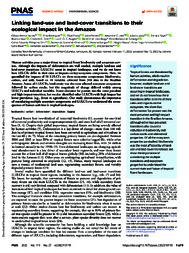Linking land-use and land-cover transitions to their ecological impact in the Amazon.
Linking land-use and land-cover transitions to their ecological impact in the Amazon.
Author(s): NUNES, C. A.; BERENGUER, E.; FRANÇA, F.; FERREIRA, J. N.; LEES, A. C.; LOUZADA, J.; SAYER, E. J.; SOLAR, R.; SMITH, C. C.; ARAGÃO, L. E. O. C.; BRAGA, D. de L.; CAMARGO, P. B. de; CERRI, C. E. P.; OLIVEIRA JUNIOR, R. C. de; DURIGAN, M.; MOURA, N.; OLIVEIRA, V. H. F.; RIBAS, C.; VAZ-DE-MELLO, F.; VIEIRA, I.; ZANETTI, R.; BARLOW, J.
Summary: Human activities pose a major threat to tropical forest biodiversity and ecosystem serv-ices. Although the impacts of deforestation are well studied, multiple land-use andland-cover transitions (LULCTs) occur in tropical landscapes, and we do not knowhow LULCTs differ in their rates or impacts on key ecosystem components. Here, wequantified the impacts of 18 LULCTs on three ecosystem components (biodiversity,carbon, and soil), based on 18 variables collected from 310 sites in the BrazilianAmazon. Across all LULCTs, biodiversity was the most affected ecosystem component,followed by carbon stocks, but the magnitude of change differed widely amongLULCTs and individual variables. Forest clearance for pasture was the most prevalentand high-impact transition, but we also identified other LULCTs with high impact butlower prevalence (e.g., forest to agriculture). Our study demonstrates the importanceof considering multiple ecosystem components and LULCTs to understand the conse-quences of human activities in tropical landscapes
Publication year: 2022
Types of publication: Journal article
Unit: Embrapa Eastern Amazon
Observation
Some of Embrapa's publications are published as ePub files. To read them, use or download one of the following free software options to your computer or mobile device. Android: Google Play Books; IOS: iBooks; Windows and Linux: Calibre.
Access other publications
Access the Agricultural Research Database (BDPA) to consult Embrapa's full library collection and records.
Visit Embrapa Bookstore to purchase books and other publications sold by Embrapa.

